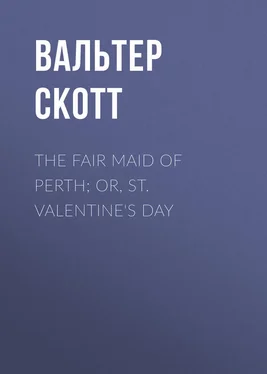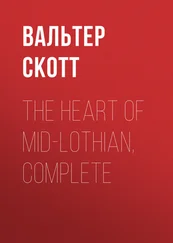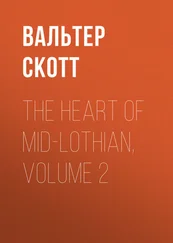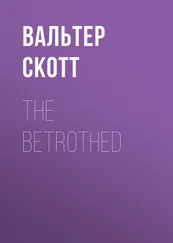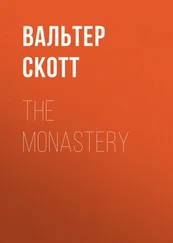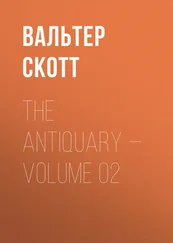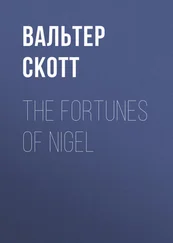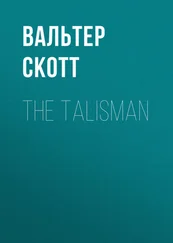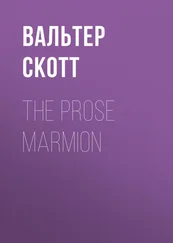Вальтер Скотт - The Fair Maid of Perth; Or, St. Valentine's Day
Здесь есть возможность читать онлайн «Вальтер Скотт - The Fair Maid of Perth; Or, St. Valentine's Day» — ознакомительный отрывок электронной книги совершенно бесплатно, а после прочтения отрывка купить полную версию. В некоторых случаях можно слушать аудио, скачать через торрент в формате fb2 и присутствует краткое содержание. Издательство: Иностранный паблик, Жанр: foreign_antique, foreign_prose, Альтернативная история, на английском языке. Описание произведения, (предисловие) а так же отзывы посетителей доступны на портале библиотеки ЛибКат.
- Название:The Fair Maid of Perth; Or, St. Valentine's Day
- Автор:
- Издательство:Иностранный паблик
- Жанр:
- Год:неизвестен
- ISBN:нет данных
- Рейтинг книги:4 / 5. Голосов: 1
-
Избранное:Добавить в избранное
- Отзывы:
-
Ваша оценка:
- 80
- 1
- 2
- 3
- 4
- 5
The Fair Maid of Perth; Or, St. Valentine's Day: краткое содержание, описание и аннотация
Предлагаем к чтению аннотацию, описание, краткое содержание или предисловие (зависит от того, что написал сам автор книги «The Fair Maid of Perth; Or, St. Valentine's Day»). Если вы не нашли необходимую информацию о книге — напишите в комментариях, мы постараемся отыскать её.
The Fair Maid of Perth; Or, St. Valentine's Day — читать онлайн ознакомительный отрывок
Ниже представлен текст книги, разбитый по страницам. Система сохранения места последней прочитанной страницы, позволяет с удобством читать онлайн бесплатно книгу «The Fair Maid of Perth; Or, St. Valentine's Day», без необходимости каждый раз заново искать на чём Вы остановились. Поставьте закладку, и сможете в любой момент перейти на страницу, на которой закончили чтение.
Интервал:
Закладка:
“There is more in it than that, friend,” said Oliver, significantly.
“Why, that is well, neighbour: I love to hear you speak in your own scholarly tone again. Cheer up, you have seen the villain’s back, and regained the trophies you had lost when taken at advantage.”
“Ah, Henry Gow – Henry Gow – ” said the bonnet maker, and stopped short with a deep sigh, nearly amounting to a groan.
“What is the matter?” asked his friend – “what is it you vex yourself about now?”
“I have some suspicion, my dearest friend, Henry Smith, that the villain fled for fear of you, not of me.”
“Do not think so,” replied the armourer: “he saw two men and fled, and who can tell whether he fled for one or the other? Besides, he knows by experience your strength and activity: we all saw how you kicked and struggled when you were on the ground.”
“Did I?” said poor Proudfute. “I do not remember it, but I know it is my best point: I am a strong dog in the loins. But did they all see it?”
“All as much as I,” said the smith, smothering an inclination to laughter.
“But thou wilt remind them of it?”
“Be assured I will,” answered Henry, “and of thy desperate rally even now. Mark what I say to Bailie Craigdallie, and make the best of it.”
“It is not that I require any evidence in thy favour, for I am as brave by nature as most men in Perth; but only – ” Here the man of valour paused.
“But only what?” inquired the stout armourer.
“But only I am afraid of being killed. To leave my pretty wife and my young family, you know, would be a sad change, Smith. You will know this when it is your own case, and will feel abated in courage.”
“It is like that I may,” said the armourer, musing.
“Then I am so accustomed to the use of arms, and so well breathed, that few men can match me. It’s all here,” said the little man, expanding his breast like a trussed fowl, and patting himself with his hands – “here is room for all the wind machinery.”
“I dare say you are long breathed – long winded; at least your speech bewrays – ”
“My speech! You are a wag – But I have got the stern post of a dromond brought up the river from Dundee.”
“The stern post of a Drummond!” exclaimed the armourer; “conscience, man, it will put you in feud with the whole clan – not the least wrathful in the country, as I take it.”
“St. Andrew, man, you put me out! I mean a dromond – that is, a large ship. I have fixed this post in my yard, and had it painted and carved something like a soldan or Saracen, and with him I breathe myself, and will wield my two handed sword against him, thrust or point, for an hour together.”
“That must make you familiar with the use of your weapon,” said the smith.
“Ay, marry does it; and sometimes I will place you a bonnet – an old one, most likely – on my soldan’s head, and cleave it with such a downright blow that in troth, the infidel has but little of his skull remaining to hit at.”
“That is unlucky, for you will lose your practice,” said Henry. “But how say you, bonnet maker? I will put on my head piece and corselet one day, and you shall hew at me, allowing me my broadsword to parry and pay back? Eh, what say you?”
“By no manner of means, my dear friend. I should do you too much evil; besides, to tell you the truth, I strike far more freely at a helmet or bonnet when it is set on my wooden soldan; then I am sure to fetch it down. But when there is a plume of feathers in it that nod, and two eyes gleaming fiercely from under the shadow of the visor, and when the whole is dancing about here and there, I acknowledge it puts out my hand of fence.”
“So, if men would but stand stock still like your soldan, you would play the tyrant with them, Master Proudfute?”
“In time, and with practice, I conclude I might,” answered Oliver. “But here we come up with the rest of them. Bailie Craigdallie looks angry, but it is not his kind of anger that frightens me.”
You are to recollect, gentle reader, that as soon as the bailie and those who attended him saw that the smith had come up to the forlorn bonnet maker, and that the stranger had retreated, they gave themselves no trouble about advancing further to his assistance, which they regarded as quite ensured by the presence of the redoubted Henry Gow. They had resumed their straight road to Kinfauns, desirous that nothing should delay the execution of their mission. As some time had elapsed ere the bonnet maker and the smith rejoined the party, Bailie Craigdallie asked them, and Henry Smith in particular, what they meant by dallying away precious time by riding uphill after the falconer.
“By the mass, it was not my fault, Master Bailie,” replied the smith. “If ye will couple up an ordinary Low Country greyhound with a Highland wolf dog, you must not blame the first of them for taking the direction in which it pleases the last to drag him on. It was so, and not otherwise, with my neighbour Oliver Proudfute. He no sooner got up from the ground, but he mounted his mare like a flash of lightning, and, enraged at the unknightly advantage which yonder rascal had taken of his stumbling horse, he flew after him like a dromedary. I could not but follow, both to prevent a second stumble and secure our over bold friend and champion from the chance of some ambush at the top of the hill. But the villain, who is a follower of some Lord of the Marches, and wears a winged spur for his cognizance, fled from our neighbour like fire from flint.”
The senior bailie of Perth listened with surprise to the legend which it had pleased Gow to circulate; for, though not much caring for the matter, he had always doubted the bonnet maker’s romancing account of his own exploits, which hereafter he must hold as in some degree orthodox.
The shrewd old glover looked closer into the matter. “You will drive the poor bonnet maker mad,” he whispered to Henry, “and set him a-ringing his clapper as if he were a town bell on a rejoicing day, when for order and decency it were better he were silent.”
“Oh, by Our Lady, father,” replied the smith, “I love the poor little braggadocio, and could not think of his sitting rueful and silent in the provost’s hall, while all the rest of them, and in especial that venomous pottingar, were telling their mind.”
“Thou art even too good natured a fellow, Henry,” answered Simon. “But mark the difference betwixt these two men. The harmless little bonnet maker assumes the airs of a dragon, to disguise his natural cowardice; while the pottingar wilfully desires to show himself timid, poor spirited, and humble, to conceal the danger of his temper. The adder is not the less deadly that he creeps under a stone. I tell thee, son Henry, that, for all his sneaking looks and timorous talking, this wretched anatomy loves mischief more than he fears danger. But here we stand in front of the provost’s castle; and a lordly place is Kinfauns, and a credit to the city it is, to have the owner of such a gallant castle for its chief magistrate.”
“A goodly fortalice, indeed,” said the smith, looking at the broad winding Tay, as it swept under the bank on which the castle stood, like its modern successor, and seemed the queen of the valley, although, on the opposite side of the river, the strong walls of Elcho appeared to dispute the pre-eminence. Elcho, however, was in that age a peaceful nunnery, and the walls with which it was surrounded were the barriers of secluded vestals, not the bulwarks of an armed garrison.
“‘Tis a brave castle,” said the armourer, again looking at the towers of Kinfauns, “and the breastplate and target of the bonny course of the Tay. It were worth lipping a good blade, before wrong were offered to it.”
Читать дальшеИнтервал:
Закладка:
Похожие книги на «The Fair Maid of Perth; Or, St. Valentine's Day»
Представляем Вашему вниманию похожие книги на «The Fair Maid of Perth; Or, St. Valentine's Day» списком для выбора. Мы отобрали схожую по названию и смыслу литературу в надежде предоставить читателям больше вариантов отыскать новые, интересные, ещё непрочитанные произведения.
Обсуждение, отзывы о книге «The Fair Maid of Perth; Or, St. Valentine's Day» и просто собственные мнения читателей. Оставьте ваши комментарии, напишите, что Вы думаете о произведении, его смысле или главных героях. Укажите что конкретно понравилось, а что нет, и почему Вы так считаете.
